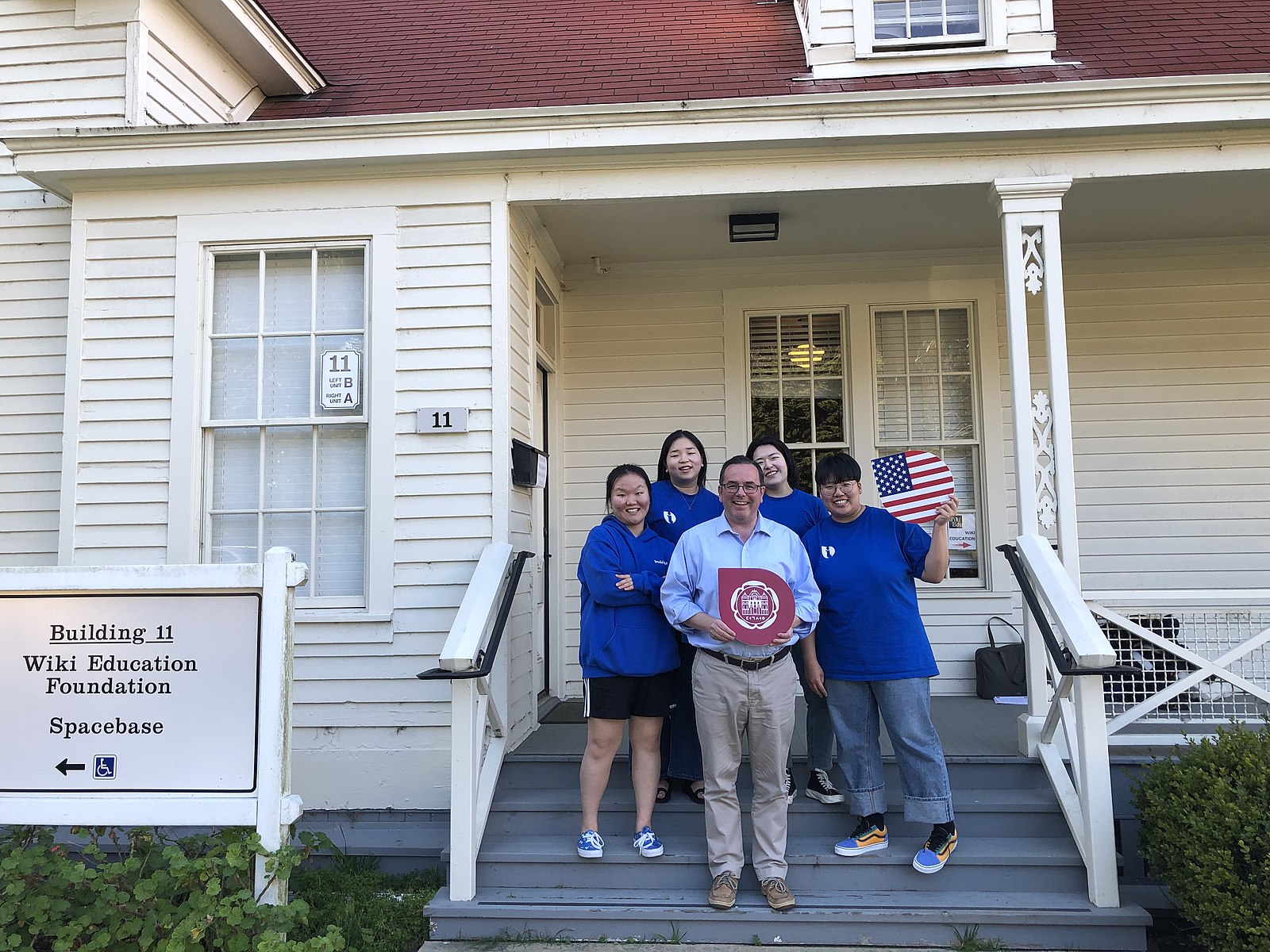Highlights
- We had our All Staff Meeting, a week-long opportunity for remote staff to join the San Francisco-based team members for a week of meetings, collaboration, and socializing.
- In February Paul Carroll began as Director, Institutional Funding. Having spent his professional career at the nexus of philanthropy, government, and nonprofits, Paul is a great fit for establishing and cultivating Wiki Education’s relationships with institutional donors; managing day-to-day fundraising activities; and ensuring that all of us here at Wiki Education deliver on our giving agreements.
- One of our most successful and long-term Wiki Scholars collaborations has been with the National Archives and Records Administration (NARA). It was about a year and a half ago that we ran our first course in support of their exhibit, Rightfully Hers, celebrating the centennial of the Nineteenth Amendment in the United States. This month Scholars & Scientists Program Manager Ryan McGrady and Executive Director Frank Schulenburg and two program participants visited NARA. We met with NARA staff to discuss the collaboration and went on a tour of the excellent and timely exhibit we have worked hard to support. Thanks to NARA for hosting us. We are looking forward to possible future collaborations!
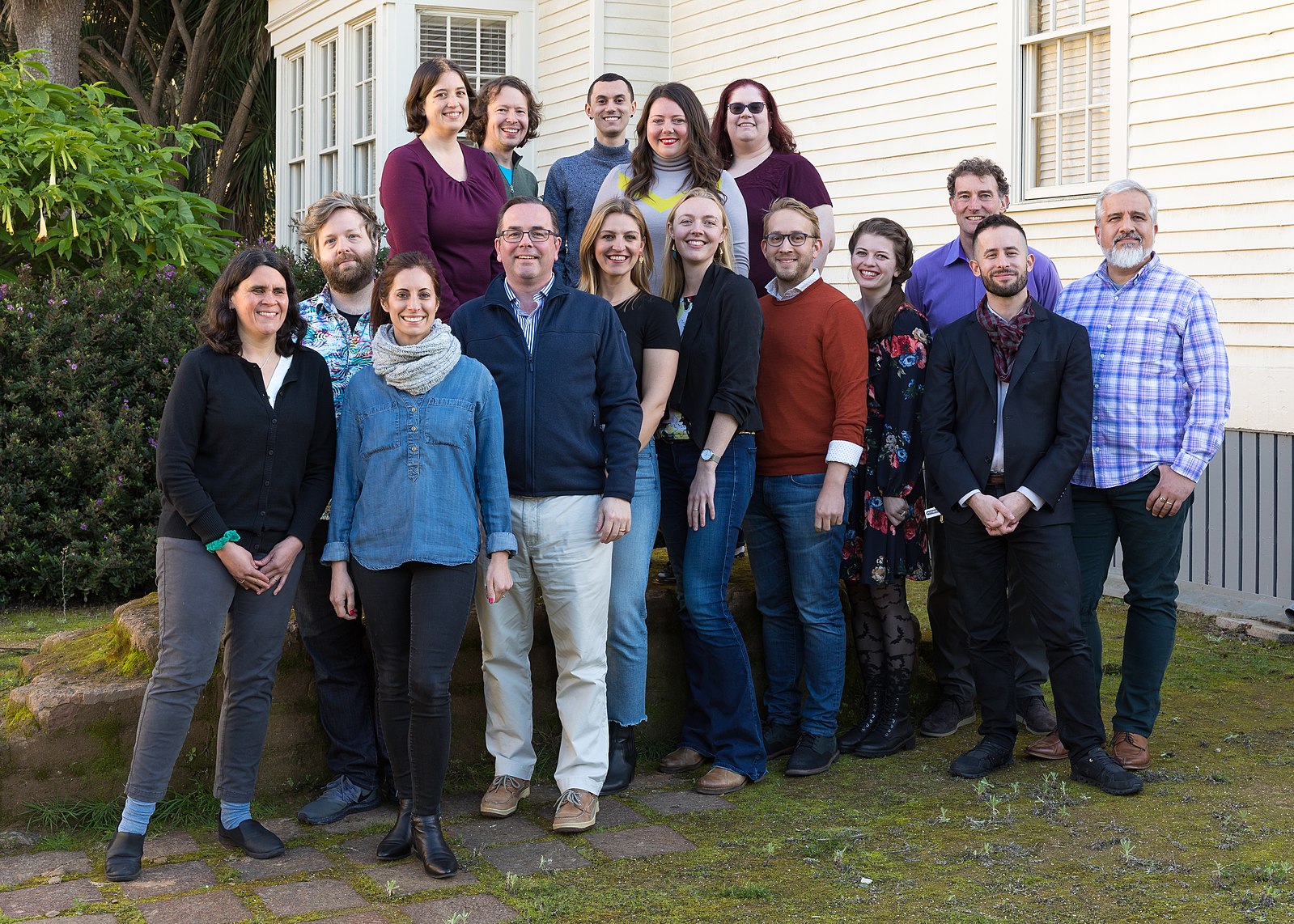
Programs
This month, we had our All Staff, a week-long opportunity for remote staff to join the San Francisco-based team members for a week of meetings, collaboration, and socializing. The schedule enabled the Programs team to spend some time as a group, kicking off our planning process for next fiscal year. Our Wikipedia Experts also came into town one day earlier, giving them an opportunity to have a pre-meeting gathering to discuss their team processes and collaboration.
Wikipedia Student Program
Status of the Wikipedia Student Program for Spring 2020 in numbers, as of February 29:
- 352 Wiki Education courses were in progress (232, or 66%, were led by returning instructors).
- 5,741 student editors were enrolled.
- 57% of students were up-to-date with their assigned training modules.
- Students edited 1,960 articles, created 65 new entries, and added 691,000 words and 7,460 references.
Throughout February, students began to dive deeper into their Wikipedia assignments. Now that they learned some of the basics of Wikipedia editing, they began to choose their topics, collect their research, and begin some initial drafts of their work. Some ambitious students even began to move their work into the article main space!
We launched some major enhancements to our course dashboard for both instructors and students, and we’re excited to see how these new features help faculty and students both navigate the Wikipedia assignment and ultimately improve Wikipedia.
In February, Wikipedia Student Program Manager Helaine Blumenthal participated in a webinar run by Cleveland State University’s Center for Faculty Excellence. During the program, Helaine discussed some best practices for running a Wikipedia assignment as well as the motivations for doing so. Wikipedia Experts Shalor Toncray, Elysia Webb, and Ian Ramjohn were busy tracking student work and ensuring that students were on the right path for success with their Wikipedia project.
Student work highlights:
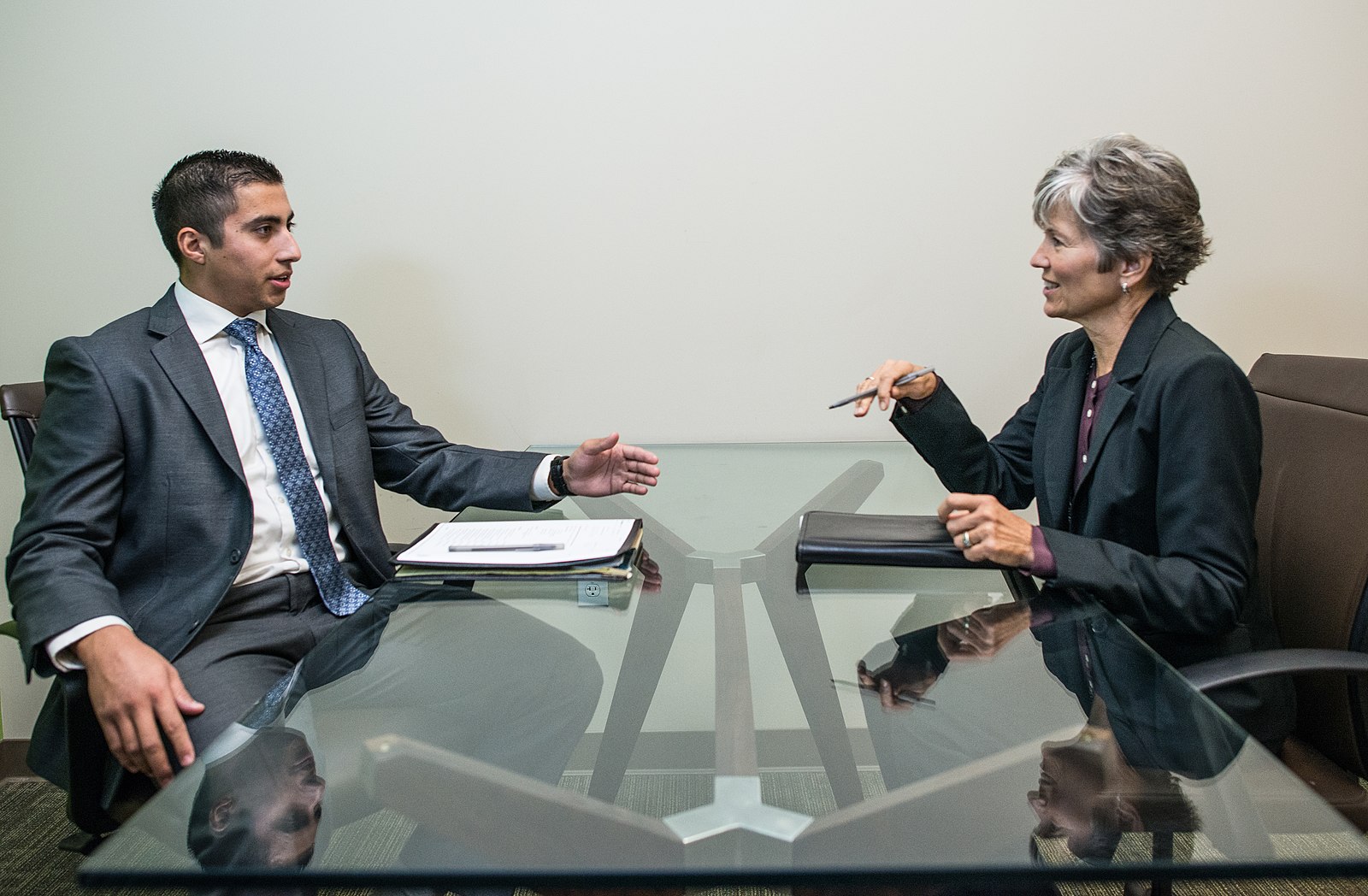
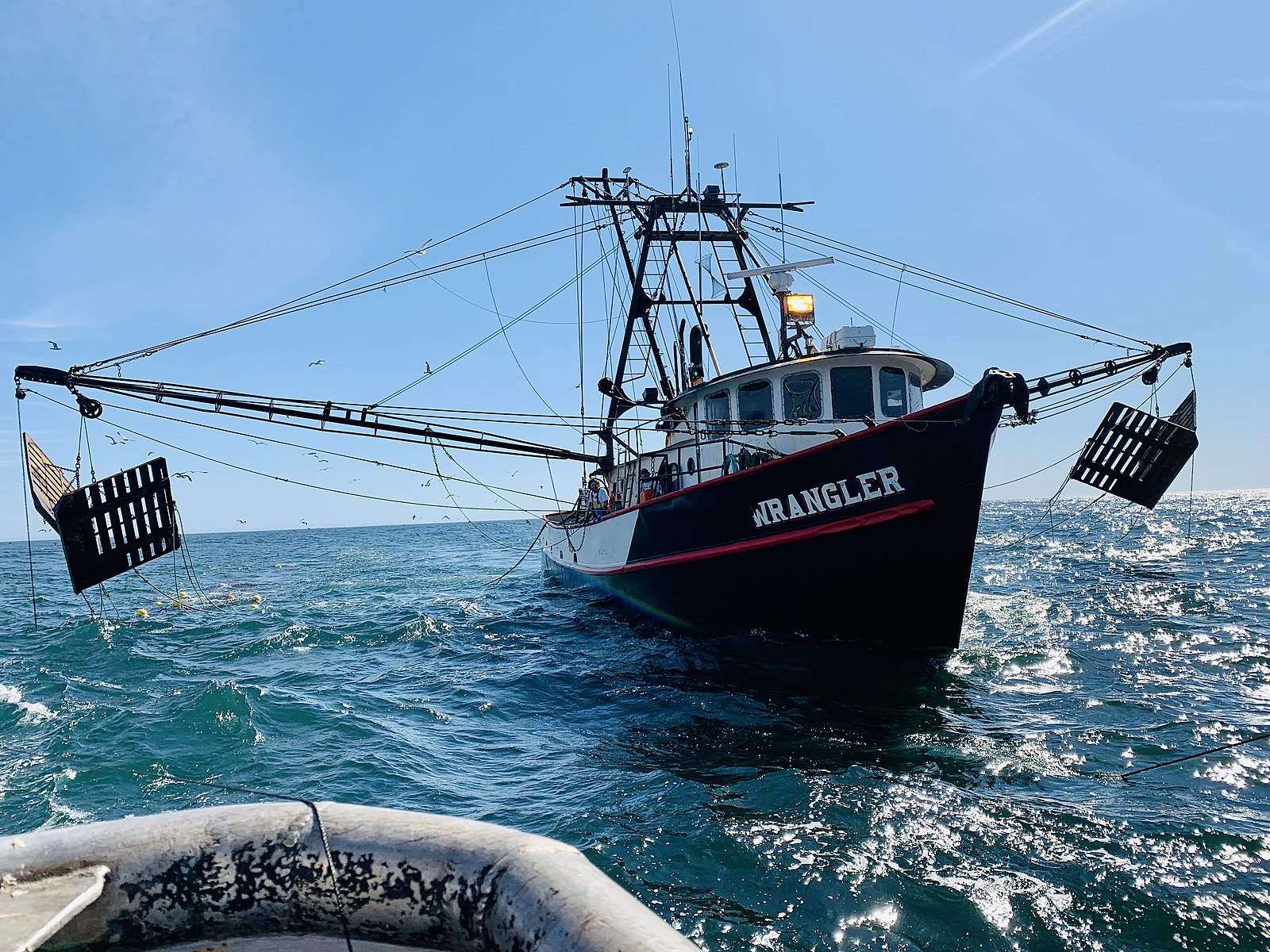
One student-authored article appeared on Wikipedia’s Main Page in the Did You Know? section: Template:Did you know nominations/Diversity ideologies, on February 1.
This term, Middle Georgia State University students in Gerald Lucas’s Writing in Digital Environs class worked to improve Wikipedia’s coverage of various topics ranging from substances poisonous to dogs to history. However all of the students worked together to expand an article for Norman Mailer’s The Faith of Graffiti, a 1974 essay about New York City’s graffiti artists. Through interviews, exploration, and analyses, the 12,000-word essay explores the political and artistic implications of graffiti. Like several of his other non-fiction narratives, Mailer employs new journalism: he adopts a persona, here the A-I or “Aesthetic Investigator”, to provide both an objective distance from the topic and to engender the text with the creative and critical eye of the novelist. Unlike many of Mailer’s other works, this received less attention from critics. It was also considered to be controversial when originally published due to Mailer’s apparent glorification of the graffiti artist. One of the students also created an article for Madwoman, the fourth collection of poetry by Jamaican American poet Shara McCallum. The poems in Madwoman discuss three different stages: childhood, adulthood, and motherhood, in relation to the study of identity and what it means to be a woman.
Before medical staff perform a procedure on a patient, they are expected to discuss the treatment with the patient and/or guardian and gain their consent to treat. Called informed consent, this allows the individual to make an educated decision on whether or not a procedure is worth the potential side effects or risks. Informed consent has evolved over the years; it wasn’t until the Enlightenment movement in the 18th and 19th centuries that it was believed that patients were sufficiently educated to understand their doctors’ requirements and prescriptions. Even then, it was still not believed that patients could reliably form their own opinions nor make appropriate medical decisions for themselves. Flash forward to the 1950s. A man named Martin Salgo was diagnosed with a blood vessel blockage in his abdomen by Stanford physician Dr. Frank Gerbode, who recommended an investigative procedure using sodium urokon to discover the exact location of the blockage and if successful, a subsequent operation to remove it. Salgo was admitted and the investigative procedure conducted, however the next day Salgo woke up paralyzed in the lower extremities. In the resulting malpractice suit, Salgo v. Leland Stanford Jr. University Board of Trustees, lawyers for the plaintiff argued that neither Salgo nor his family were made properly and fully aware of the potential risks and practices associated with the procedure, which the physicians eventually acknowledged. There were also additional concerns that the procedure was not necessary and was performed incorrectly, as the physicians used anywhere from approximately 2-5 times the highest dose recommended by the sodium urokon manufacturer. While today the lack of informed consent would be obvious, during Salgo’s case, it had not yet been clarified in court what was needed for a patient to be considered “reasonably informed.” The courts determined that while Salgo was able to prove that the physicians were negligent, Gerbode was not held liable as there was no explicit agreement that he would perform the surgery, as it was common practice for the attending physician to not be present for the procedure. This helped to set a precedent for the following cases in terms of the patient being adequately informed. If there was a failure to disclose information, danger, and alternatives, there was cause for legal action. However, what adequate information looked like would be established with later cases. A landmark case, there was previously no article for Salgo v. Leland
Stanford Jr. University Board of Trustees on Wikipedia until a student in Benjamin Mako Hill’s Interpersonal Media class at the University of Washington noticed that it was missing.
Representation matters, and our students are changing the face of what a scientist looks like by adding biographies to Wikipedia. In addition to adding biographies of women scientists, our students add and improve scientists of other underrepresented groups. In the WiSE course at Saint Mary’s College, students were challenged to “research a scientist who represents a group that is underrepresented in science, and you will contribute to a Wikipedia article about them”. Articles like Squire Booker, an African-American biochemist, were greatly expanded from a mere 46 words (exactly two sentences) to more than 600 words! African-American chemist Gregory H. Robinson didn’t even have a biography, despite his 150+ publications, numerous awards, and status as a Fellow of the Royal Society of Chemistry. The dedicated efforts of these ten students brought more than 17,000 words to Wikipedia, well-sourced with more than 250 references. Because only 9% of STEM workers in the US are black, the public might be used to thinking of scientists that look a certain way. The more than 8,000 visitors to the pages edited by these students hopefully left with new perceptions of who can be a scientist.
Beach pollution is an important consequence of marine pollution, and can include everything from plastic bottles and fishing gear to oil spill clean-up. A student in Julio Postigo’s Human Dimensions of Global Environmental Change class converted Wikipedia’s short article beach cleaning into a substantial and well-referenced one. Another student converted the short and fairly uninformative article on Climate change in Mexico into a lengthy and informative one. Readily-available information about environmental issues like this in developing countries is often hard to find, so this article fills an important need. A third student fleshed out the fishery cooperative article, which was a short and poorly-developed outline.
Scholars & Scientists Program
Wikipedia
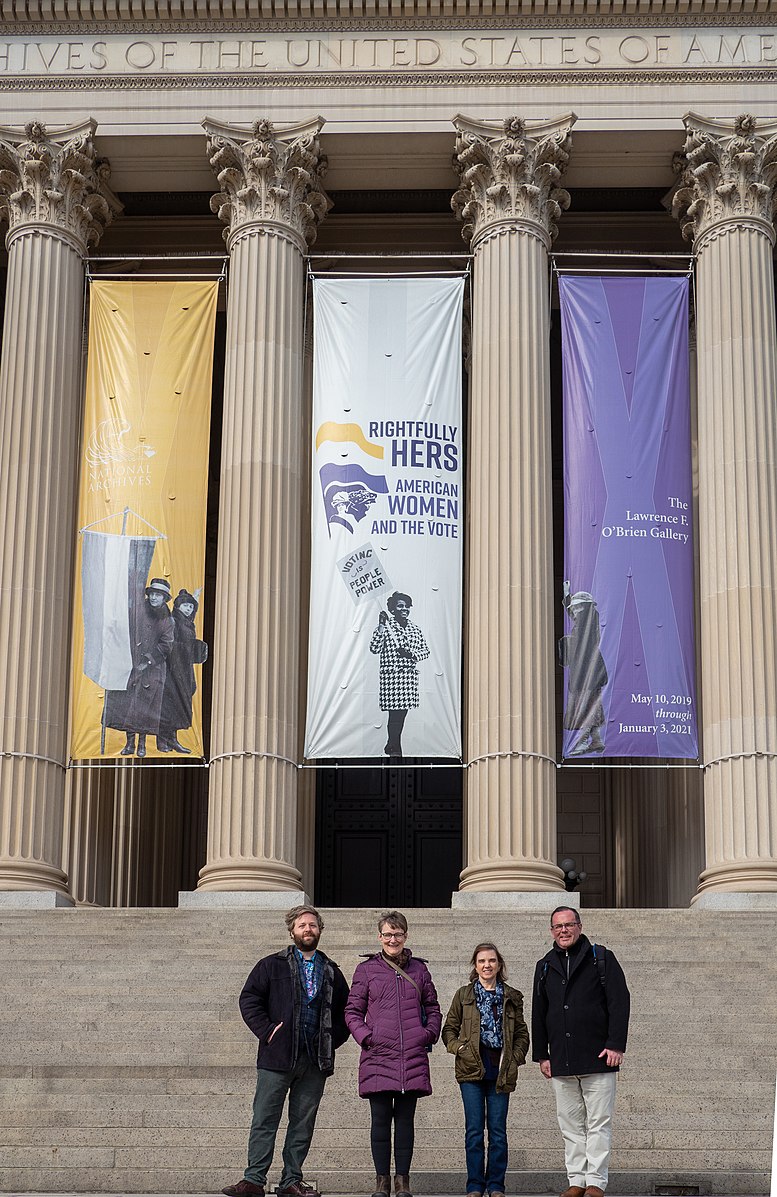
One of our most successful and long-term Wiki Scholars collaborations has been with the National Archives and Records Administration (NARA). It was about a year and a half ago that we ran our first course in support of their exhibit, Rightfully Hers, celebrating the centennial of the Nineteenth Amendment in the United States. We ran a total of six courses on the subject, including one Advanced course that brought the Nineteenth Amendment article itself up to Good Article status. At the end of this month, Ryan and Frank traveled to Washington, DC, to visit NARA. We were happy that two program participants were able to join us, too: Bonnie Burns and Rose Anne Ullrich. Over the course of a day, we met with NARA staff to discuss the collaboration and went on a tour of the excellent and timely exhibit we have worked hard to support. Thanks to NARA for hosting us. We are looking forward to possible future collaborations!
We wrapped up our 8-week Science & Society Wiki Scientists course this month, with several great contributions:
- Adriana Ocampo is a Colombian planetary geologist and Science Program Manager at NASA. In recognition of her valuable contributions to space exploration, Ocampo has the unusual distinction of having an asteroid named after her. A Wiki Scientist significantly expanded coverage of her accomplishments and rewrote the lead.
- Dead Birds (1963 film), a 1963 documentary by Robert Gardner about the ritual warfare cycle of the Dugum Dani people in the western part of the island of New Guinea. A Wiki Scientist more than quadrupled the size of this renowned ethnographic film.
- The entomopathogenic nematode Steinernema carpocapsae now has a picture and has been significantly expanded.
- A Wiki Scientist expanded the article on American author and suffragist Mary Stewart Cutting Jr.. Importantly, when the course started, the subject’s article and the article about her mother had the same birth year! That has now been corrected, of course, and citations added, among other improvements.
- A Wiki Scientist also uploaded several high-quality images of frogs, which are now used in Wikipedia articles like Raorchestes jayarami
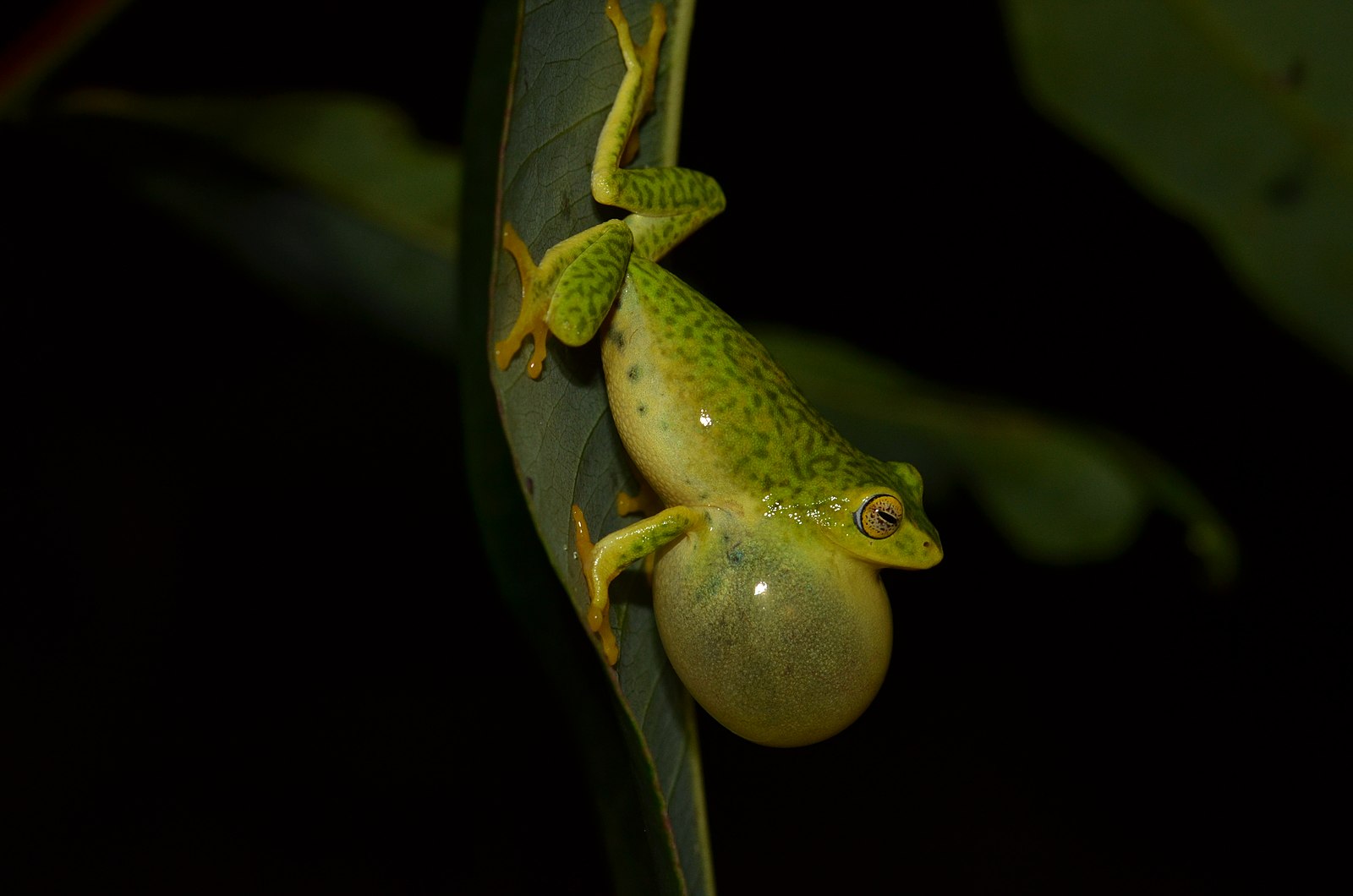
Participants in the course we are running in partnership with Keene State College, which started last month, are beginning to work in sandboxes. We are excited by the topics they are choosing, which focus on the United Nations Sustainable Development Goals.
We also launched three new courses this month. As announced in January, the WITH Foundation has sponsored a Wiki Scientists training course for scholars working in disability studies and/or healthcare. Though they are just getting started now, through our 12-week course, participants will learn to edit Wikipedia and will contribute to two articles relevant to disability. Another Wiki Scientists course began this month in partnership with the American Physical Society. In that course, scientists will work to improve or create biographies of women in physics.
Finally, we launched our second ever Advanced Wiki Scholars course. With so many capable subject-matter experts having gone through our Wiki Scholars and Wiki Scientists courses, we put out a call for participants interested to take their skills to the next level while diving into high-impact voting rights articles. We only just started at the end of this month, but excited to get to work improving these articles that so many people read every day.
Wikidata
February saw continued research into various online learning platforms. We are working to establish a set of best practices that we can use to inform the creation of our self-directed Wikidata courses. We have created a survey to gather data about what we like and don’t like about these platforms. We will be analyzing this data next month to establish best practices and identify next steps. We also published a blog about Wikidata Program Manager Will Kent’s trip to the Art Institute of Chicago, where he visited participants he had taught in his Wikidata courses. It was a great opportunity to hear how they plan to implement their new expertise into their existing work.
Visiting Scholars Program
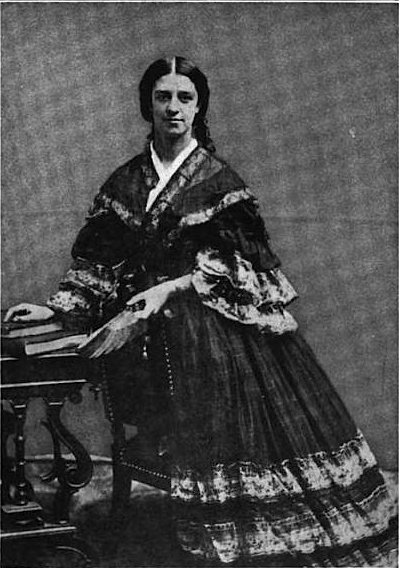
Susan Hale (1833-1910) was an American author, traveler, and watercolor painting. She spent most of her life in New England, but traveled extensively and studied under English, French, and German painters. Her biography is the latest to be improved by long-time Visiting Scholar at Northeastern University, Rosie Stephenson-Goodknight, who regularly creates or improves the quality of articles on women writers using resources available to her through Northeastern.
Another achievement this month comes from George Mason University Visiting Scholars Gary Greenbaum, who successfully brought the article on the Albany Charter half dollar to Featured Article status. This fifty-cent piece was one of several issued in 1936 and marked the anniversary of the city’s municipal charter 250 years prior. It was designed by sculptor Gertrude K. Lathrop, and depicts a beaver on the obverse side (front).
Advancement
Fundraising
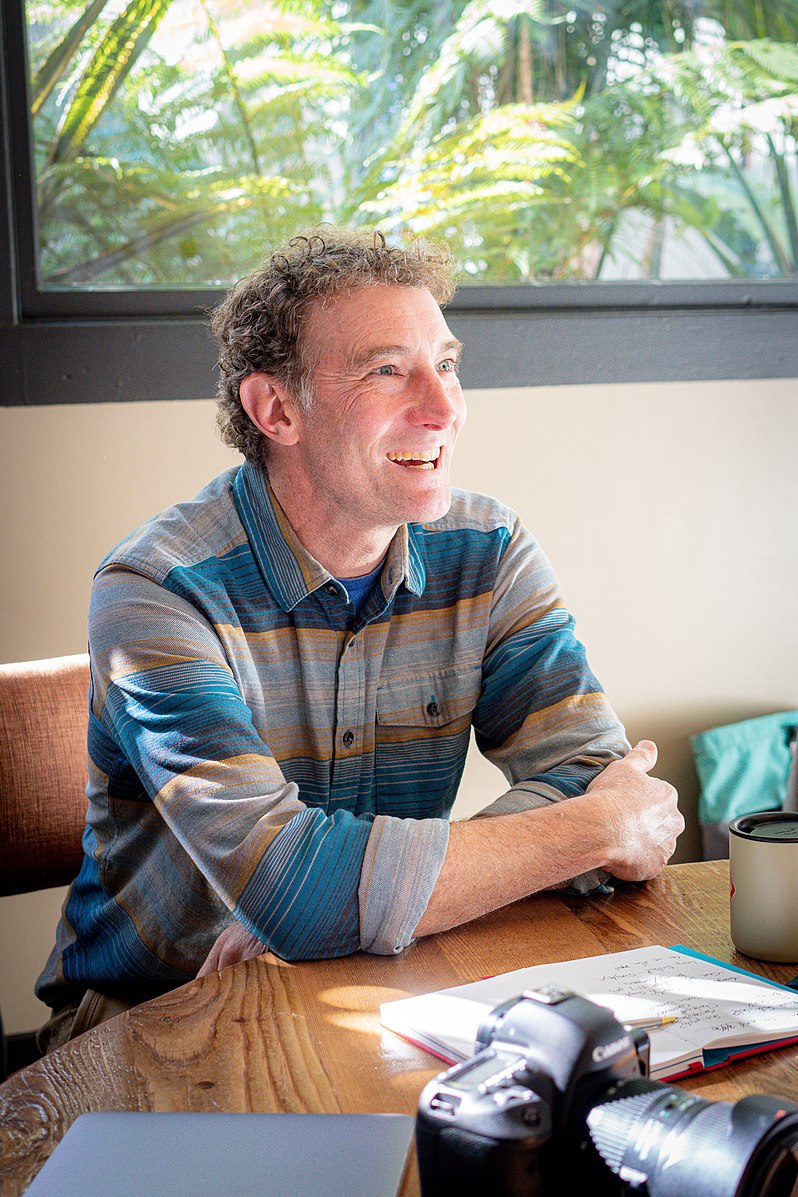
In February Paul Carroll began as Director, Institutional Funding. Having spent his professional career at the nexus of philanthropy, government, and nonprofits, Paul is a great fit for establishing and cultivating Wiki Education’s relationships with institutional donors; managing day-to-day fundraising activities; and ensuring that all of us here at Wiki Education deliver on our giving agreements. For much of the past twenty years, Paul has worked as a grantmaker with the Ploughshares Fund, a public foundation that addresses international security. Paul served as the program director with responsibilities for a roughly $6 million annual grantmaking budget. He has also served on the steering committee of the Peace and Security Funders Group (PSFG), an international network of foundations and individual donors interested in a broad range of peace, human security, and development issues. Paul has lived on both sides of the fundraising/grantmaking table – experience that adds to his understanding of and appreciation for the craft of development, communications, and partnership-building. Welcome, Paul!
Paul’s initial week was the All Staff meeting with reviews of recent Wiki Education work and outcomes, initial thoughts about the year ahead, and staff team-building and learning. Paul immersed himself in the meetings and activities and began the formal onboarding process comprised of administrative tasks and briefings with colleagues about the history of Wiki Education, Wikipedia, our financial supporters, etc.
Paul also worked with former Chief Advancement Officer TJ Bliss via video calls to understand existing funding obligations, the relationships with our donors, and the needs ahead with respect to reporting, seeking follow-on funds, and prospecting for new sources of support. In the latter half of the month, Paul began reaching out to his own network to make inquiries about funding priorities and “get the Wiki Education” name out there.
Partnerships
This month, Director of Partnerships Jami Mathewson joined colleagues from other organizations in the Open Access / Open Educational Resources (OER) community. Members of the MIT Open 2020 Working Group gathered in Palo Alto to discuss the future of OER and how we’d like to advance the movement in the next ten years. Wiki Education is excited to work with our colleagues at MIT, Creative Commons, the Hewlett Foundation, the Internet Archive, and so many other organizations working hard to advance the mission of bringing open knowledge to the world.
Communications
This month, we compiled some of our favorite guest blogs from students, who discuss why they liked their Wikipedia writing assignment so much. Students echo what we’ve found in research about the learning objectives the assignment achieves. Read more! We also published three testimonials from instructors in our Student Program. Dr. Josh DiCaglio reflects on having students understand Wikipedia’s editing culture by participating in it. Dr. Melissa Weininger and some of her students were interviewed about tackling Wikipedia’s gender gap in their Jewish women’s history course. And Dr. Stephennie Mulder discussed the benefits of trying something new in an already popular class.
This month, the communications team began implementing marketing and communications suggestions from marketing consultant M+R, who Outreach and Communications Associate Cassidy Villeneuve and Director of Partnerships Jami Mathewson began working with in the fall. The project focused on understanding the best messaging and approaches for recruiting partners and individuals interested in a Wikipedia training course related to women in STEM. Cassidy and Jami worked closely with the consultants to catch them up to speed on our recruitment strategies and also amend those strategies based on market research. M+R interviewed past participants in the Scholars & Scientists program, current partners, and some champions of our community about what they considered most valuable about Wiki Education’s training courses. We are thrilled with the work they did to help us understand our opportunities and best paths forward for expanding the Scholars & Scientists Program.
Blog posts:
- What do students think of adding to Wikipedia as an assignment? (February 3)
- Changing Wikipedia for the better (February 6)
- Catering to diverse GLAM needs to improve Wikidata (February 11)
- Wiki Education welcomes Director, Institutional Funding Paul Carroll (February 13)
- Wikidata at the Art Institute of Chicago (February 13)
- Dashboard interns Khyati and Amit join Wikipedians in the SWASTHA initiative (February 19)
- New Dashboard feature helps with grading your Wikipedia assignment (February 20)
- Wikipedia’s gender inequality tackled by Rice students writing activist articles (February 21)
- Reading Wikipedia’s editorial culture (February 26)
- Trying something new in an already popular class (February 28)
External media:
- Wikipedia’s gender inequality tackled by Rice students writing ‘activist’ articles. Katharine Shilcutt. Rice University News and Media Relates Office of Public Affairs. (February 10)
- Thursday’s Show: Bloomberg Campaigning In Texas, And Representation Of Women On Wikipedia, Michael Hagerty, Houston Public Media (February 27)
Technology
Our focus in February was to complete the initial set of features for making it easier for instructors to find and evaluate the key stages of Wikipedia assignment. In mid-February we launched a redesigned Students tab, which provides access to the specific sandbox pages where students are guided to prepare bibliographies, draft articles, and review each other’s work. The next phase of this project will be to conduct a series of usability tests with instructors to learn how these updates fit into their grading workflows and identify key areas for improving the interface further.
February also marked the last stretch of our winter Outreachy internship projects, which conclude at the beginning of March. Lalitha Reddy completed a partial conversion of the Dashboard’s campaign pages to the React framework we use throughout most of the rest of the site. This lays the groundwork for a smoother and faster user experience for exploring and monitoring sets of courses and projects. Glory Agatevure built out a number of new features to our experimental Android app version of the Dashboard, including adding support for browsing campaigns.
Software Developer Wes Reid began work on migrating our system for sending high-volume emails from Salesforce to dedicated email platforms. We typically send emails to large groups of instructors who have expressed interest in using a Wikipedia assignment in the coming term, as well as people whom Wiki Education staff met at conferences. Salesforce provides some support for mass emailing, but has strict volume limits and limited support for the ‘unsubscribe’ options we want to add to these marketing-type emails.
Finance & Administration
The total expenditures for the month of February were $208K, +$9K than the budget of $199K. The Board was under ($8K) due to timing, as the expenses budgeted for February occurred in January. Fundraising was over +$8K with overages of +$4K in Payroll Costs, +$2K in Outside Services, +$1K Travel, +$1K in Indirect Costs. General and Administrative were over +$11K with overages of +$2K in Indirect Costs, +$8K Staff Meetings that were budgeted in January, +$2K in Office Furniture for the new Staff Member, +$2K in Travel, while under ($1K) in Occupancy. Programs were under ($2K) due to ($3K) in Indirect Costs, ($4K) Travel, ($2K) in Communications, while over +$7K in Payroll Costs.
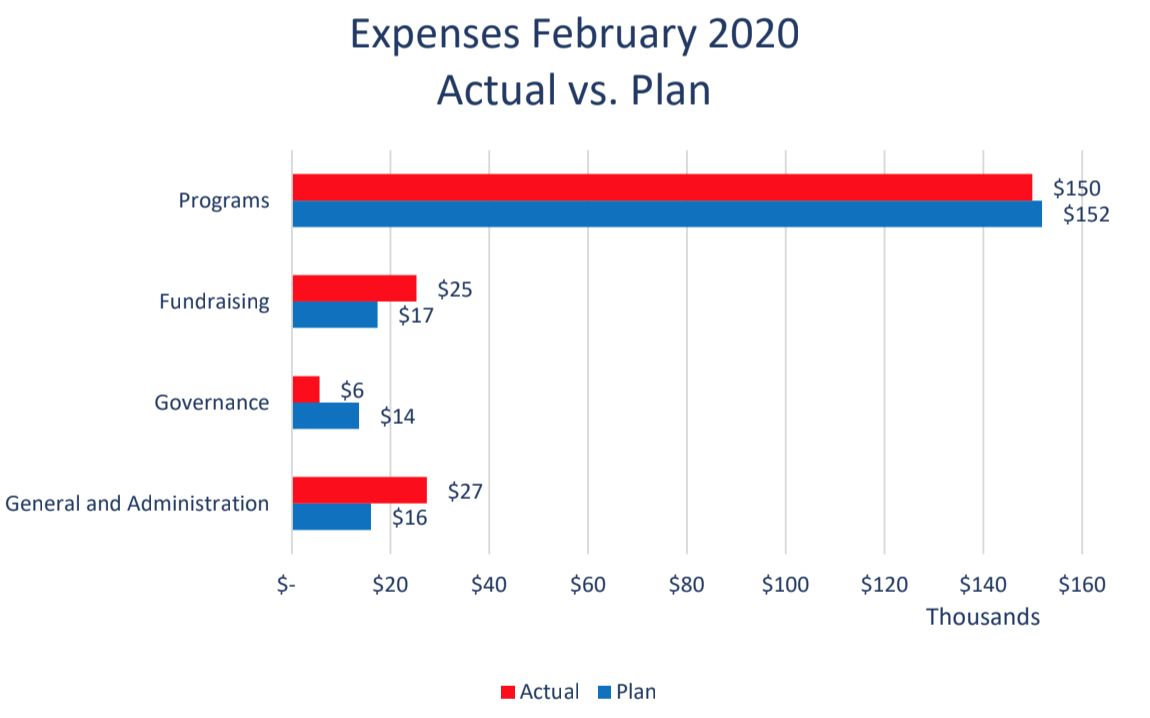
The Year-to-date expenses $1.509K were ($21K) under the budget of $1.530K. The Board and Fundraising are right on target. General and Administration is over by +$87K of which +$100K in Indirect Costs, +$3K in Communications, +$7K in Travel, +$3K in Payroll, +$2K in Furniture, while under ($14K) in Professional Services, ($5K) in Occupancy and ($9K) in Staff Meetings and Office Expenses. Programs are under ($108K) of which, ($98K) in Indirect Costs, ($3K) Office Expenses, ($14K) Communications, ($36K) Travel while over +$38K in Payroll Costs and +$5K in Professional Fees.
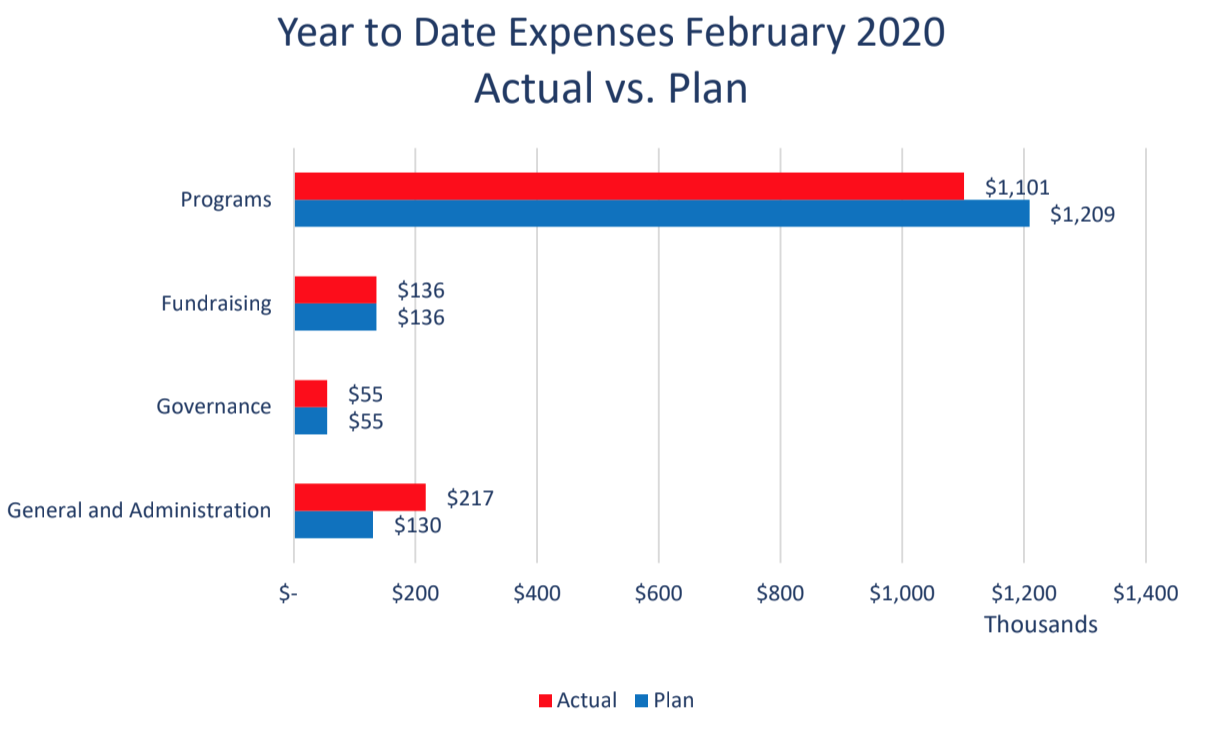
Office of the ED
Current priorities:
- All-staff meeting in San Francisco
- Onboarding of our new fundraiser
- Taking steps related to the COVID-19 outbreak
In the first week of February, Wiki Education held its traditional spring all-staff meeting in San Francisco. The meeting officially kicked off with a welcome reception at our office in the Presidio. On the second day, we started celebrating last year’s successes. We then discussed where we are with implementing the strategy, in order to get a better understanding of what needs to be done next fiscal year. On day three, individual staff members shared their learnings, including a presentation about learnings from their work with communications firm M+R by Cassidy and Jami, an update on her equity work with Alexandra Lockett from Helaine, an introduction to WikiProjects by Elysia, a presentation about Wikidata-powered math formulas by Will, a review of important Wikipedia community discussions by Ryan, and an introduction to the concept of “deep work” by Jami. On the fourth day, Frank provided staff with a big picture view on where the organization is heading in the future; subsequently, the different departments started their work on next fiscal year’s annual plan and budget. The last day being traditionally filled with social activity, staff had breakfast together before going on a cruise on the San Francisco Bay.
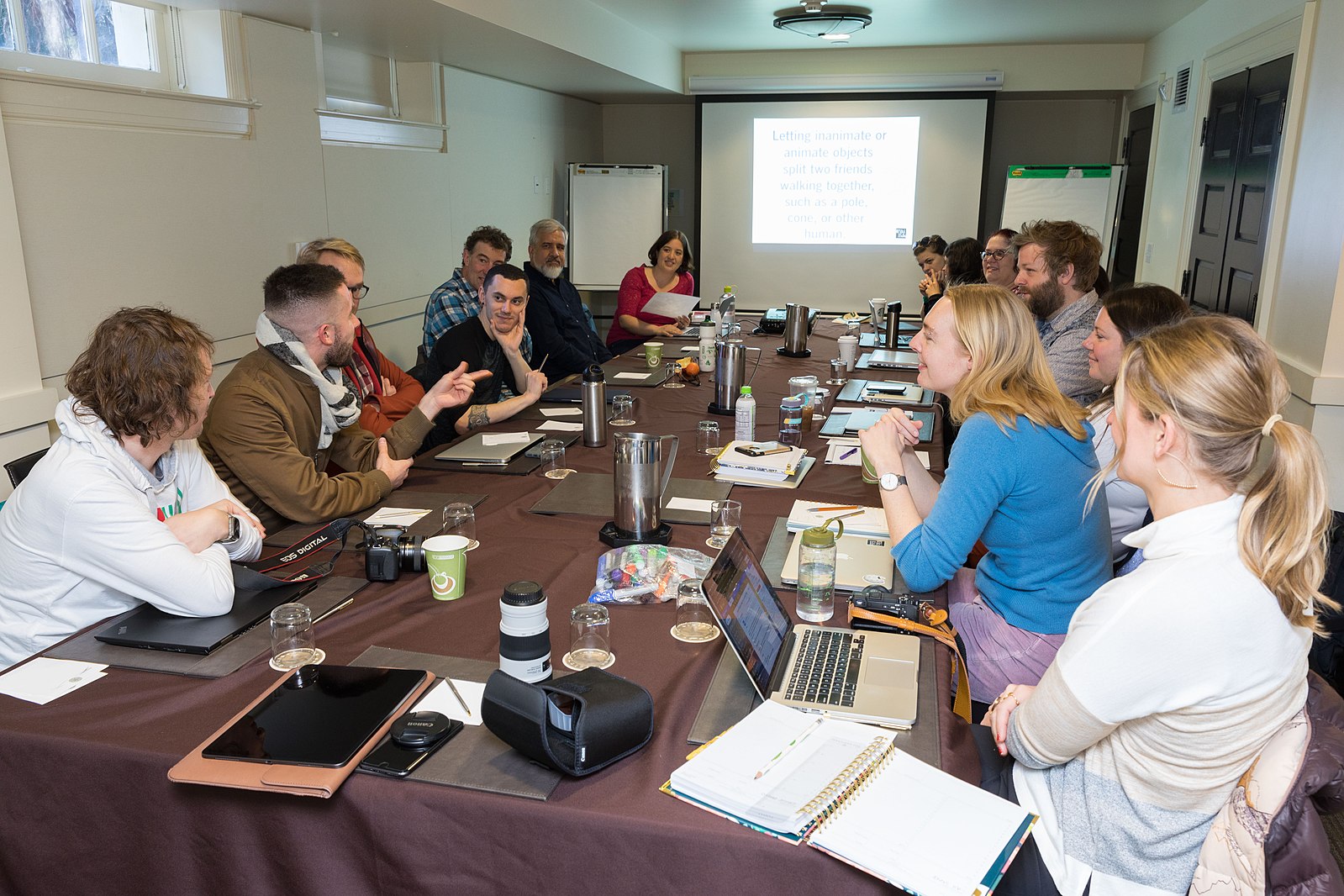
Also in February, Frank and Ryan met with representatives of the National Archives and Records Administration (NARA) and two participants of our 2019 NARA Wikipedia courses in Washington D.C. Wiki Education had supported NARA’s exhibition “Rightfully Hers”, celebrating the 100th anniversary of the 19th Amendment, by empowering several cohorts of subject-matter experts to improve Wikipedia’s coverage on topics related to women’s voting rights. The meeting served as a postmortem of the cooperation between Wiki Education and NARA and also to discuss opportunities for future collaborations.
At the end of February and in reaction to the COVID-19 outbreak in California, Frank made working out of our Presidio office optional. The measure aimed at reducing the spread of the virus and at protecting those staff members that could potentially get infected by using public transportation or rideshare services.
Visitors
- While most of the Wikimedia Foundation’s Education team — Nichole Saad, Melissa Guadalupe Huertas, and Vasanthi Hargyono — was in town for their All Hands meeting, they stopped by Wiki Education’s offices for lunch and a discussion of our work on our Student Program.
- We welcomed “The Invisible” team, an EdTech web service based in South Korea. Their purpose of visit to Wiki Education was to conduct on-site research regarding EdTech Industries and Technologies in the US market.
